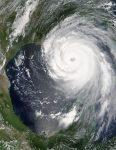
I was teaching at LSU fall ’05 when Katrina and Rita struck. Lives were turned completely upside down. Most students had one or more displaced family members, evacuated from the storm zone, living with them in their apartments; childhood homes and neighborhoods were damaged or destroyed. Kids cried in class. The stories were incredible. It was surreal.
Since then I’ve thought a lot about resilience and every post-Katrina semester would ask students in my HRM class, “Why do you think Katrina happened to us?” Of course there is no answer to that, but I’m always looking for reason and meaning in things that happen. What I do know is that going through those storms created:
- a lot of empathy and compassion in people’s hearts, especially when we see others dealing with similar challenges, and
- a teflon-like coating of resilience and fortitude that makes us a pretty tough group, practiced and equipped to handle the ever crazier world. You know the Nietzsche quote, ‘That which does not kill us makes us stronger’? Totally.
Resilience as a trait related to work success was the focus of Daryl Conner’s book Managing at the Speed of Change in the late 90s. It described (in much greater detail than below) these five characteristics of resilient people:
- positive – view change as opportunity
- focused – with a vision for re-establishing after disruption
- flexible – high tolerance for ambiguity
- organized – manage concurrent demands successfully
- proactive – reframe changing situations coming up with new approaches
In a recently released book by George Anders called The Rare Find: Spotting Exceptional Talent Before Everyone Else Does, the author identifies resilience as a key to success and a quality for which companies should recruit. Bouncing back from something like a Hurricane Katrina actually makes someone a more attractive job candidate and a better employee during turbulent economic times? Imagine that!
So, if you are resilient, reflect it on your resume.
Lastly, because a goal of this blog is to share useful information, here are a few more hurricane lessons:
- If you live in a hurricane zone, empty your freezer by August and keep it that way until at least October.
- Buy a five-day ice chest.
- When a storm is imminent, wash all dirty clothes, dishes, and towels. You will not regret this.
“It is not the strongest of the species that survives, nor the most intelligent that survives. It is the one most adaptable to change.” Charles Darwin
(or maybe not – see: http://www.darwinproject.ac.uk/one-thing-darwin-didnt-say)
 Are you stuck in a job that’s making you miserable? Do you wonder how you got to this point? Most of us have been there at one time and based on my experience, I am sure things really stink and am sorry for your pain. But, with a change of perspective, you can benefit from this mess through some valuable lessons. It is not often that life presents a steady stream of opportunities to practice and learn:
Are you stuck in a job that’s making you miserable? Do you wonder how you got to this point? Most of us have been there at one time and based on my experience, I am sure things really stink and am sorry for your pain. But, with a change of perspective, you can benefit from this mess through some valuable lessons. It is not often that life presents a steady stream of opportunities to practice and learn: Is there something really important that you want to do but can’t seem to make it happen? Are people around you telling you not to do it? Or, are they just looking at you in a funny or confused or questioning way as you try? Do the obstacles seem insurmountable?
Is there something really important that you want to do but can’t seem to make it happen? Are people around you telling you not to do it? Or, are they just looking at you in a funny or confused or questioning way as you try? Do the obstacles seem insurmountable?